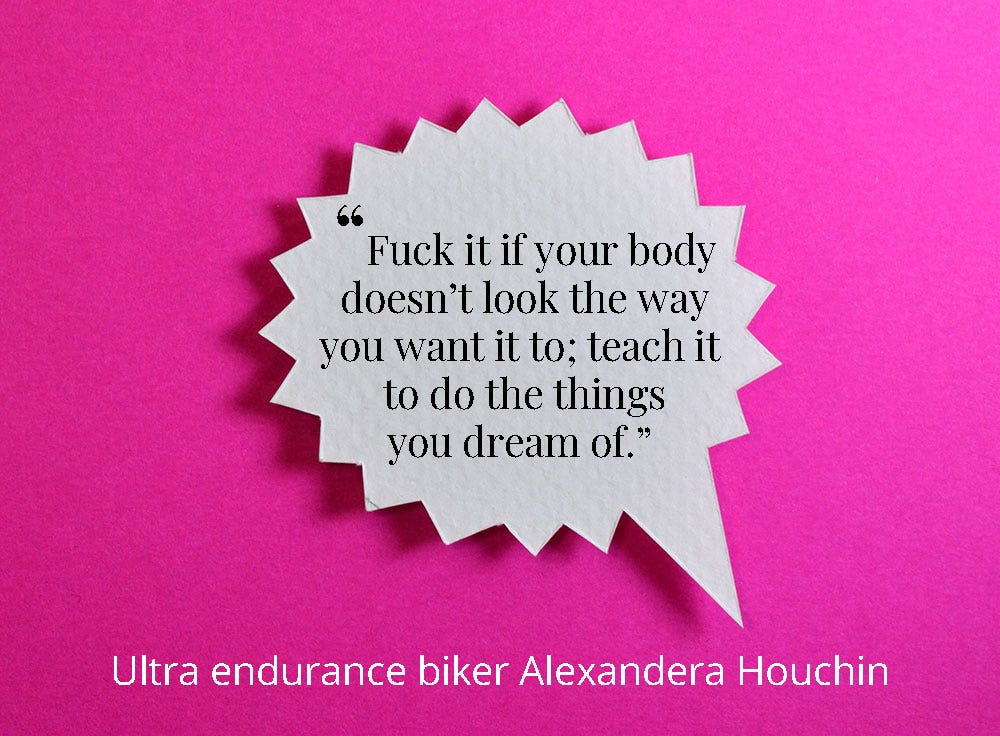Thanks for reading Almost Sated, a newsletter about the messy process of detoxing from diets, diet culture and self-suppression. If you like what you’re reading, please consider subscribing and sharing! It’s free to join, and subscribing ensures you never miss a post!
I introduced this new feature last week, but on Mondays I’m posting links to the most interesting reads from the last week. This week’s is going to be short and sweet—and later than I intended—because I’ve been dealing with a little vacation situation. I’m coming to you from Bend, Oregon, where Hubs, myself and my girls are attempting to do a working vacationing. We had a series of unfortunate events that required us to pack up find another vacation rental. It’s all resolved now, but so here are the most interesting links from the past week!
GIWIIZHAAMIN
“Fuck it if your body doesn’t look the way you want it to; teach it to do the things you dream of.” —ultra-endurance biker Alexandera Houchin
My sis sent me this short but powerful first-person essay by bikepacker Alexandera` Houchin on working to make peace with her body. Houchin stumbled upon the ultra-endurance biking and gravel racing scene a few years ago and got an astounding amount of attention within this niche community because she didn’t fit the mold of what a successful, record-breaking endurance mountain biker should look like. She was and is a larger-bodied, Native American woman who largely races on a single speed—a bike with only gear—for hundreds and sometimes thousands of miles. She is the only woman who holds back-to-back titles in the grueling, 2,750-mile Tour Divide. As I write, she’s competing in the 2023 Tour Divide. And she has written openly about her struggles with her body size, disordered eating and drug use.
It’s safe to say she’s been fighting stereotypes since she got on the bike, but her determination, struggle and honesty have made her a favorite among racing fans and cyclists of all type. I discovered Houchin when I first got into mountain biking and read this piece about “cycling’s underdog” in Bicycling.com:
Houchin always knew that she was big. “Everybody in my family was big,” she says. “My [paternal] grandmother weighed 400 pounds. We shared food and loved each other. It was such an integral part of my life.”
But it wasn’t until watching her performance on videotape of a synchronized swimming competition in seventh grade that Houchin began to realize that other people saw her as fat. “That was the first time I heard people in the crowd say things like ‘moooooo’ and ‘Free Willy!’ I realized they were talking about me, and it was definitely traumatizing. And pretty much from that point on I told myself that I was fat.”
Once I learned her story, all that she had accomplished and overcome, I immediately saw her for who she is—a role model and a trailblazer.
Her recent piece reflects the evolution of her feelings about her body.
I’ve been thinking about my body day in and day out as I prepare to give myself to the trail again. I am trying to love myself. I am trying to remember how blessed I am to have the opportunity to do something that I love most days of my life. I am trying to be the woman my ancestors believed I would become. I am not trapped in a body that I hate; I was blessed with a body that transforms.
Keep riding, and writing, Alexandera—we want to hear from you!
Structured eating can be part of Intuitive Eating
The second piece is from
, a recent subscriber to Almost Sated and a non-diet nutritionist based in Ireland. She writes about how structured eating—meal planning and prep—can be helpful for those transitioning to intuitive eating.With structured eating the difference is that the structure is there to be supportive and flexible. Not rigid like a diet plan. You can’t fail with your own menu plan. If you decide in the moment to go with something different than what you had planned, that is fine. Attuned eating and intuitive eating are all about flexibility.
While I personally find meal planning about as much fun as pulling teeth (I feel that way about cooking, too), there is definitely a time and place when it can be supportive for those transitioning to intuitive eating from diets and diet culture. It’s also incredibly important to implement a structured approach to eating and meal planning when you’re supporting someone with an eating disorder.
What have you been reading lately? I’d love to hear about it. Drop me a line below!
Thanks for reading Almost Sated. Right now, I’m focused on getting this newsletter into the hands of people who need it. If you found what you read interesting, encouraging, or helpful, please make sure you’re subscribed and consider sharing it with others.






Thank you so much for reading and sharing my article Kristi. I am glad that it resonated!
I appreciate this article too because I believe that the more we talk about these things and the more we question it, the greater the chances for some real cultural change.